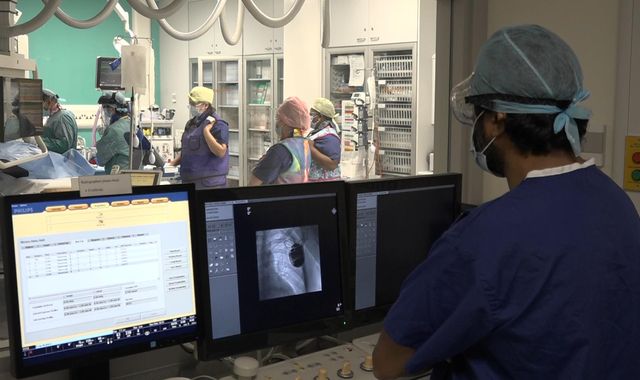Coronavirus: ‘The first wave was a trial run’ – what lockdown easing may mean for hospitals
Written by News on 04/07/2020
On the same weekend as pubs and bars in England open their doors for the first time since lockdown was imposed, we pause to honour the NHS as it reaches its 72nd birthday.


The two events – lockdown easing and acknowledging our healthcare workers – are inextricably linked. The pandemic has made it that way.
During the height of the outbreak, A&E waiting rooms were almost deserted. Doctors feared for their missing patients.
They are filling up again in numbers that are manageable. That could change over the next 48 hours.
Staff I spoke to in the emergency department at University Hospital Coventry have legitimate concerns.
It could be Saturday night business as usual when it is anything but. We are still in the middle of a pandemic.
“It’s made it more challenging. The pandemic is not something that’s there one day and gone the next.
“COVID-19 will stay around for a long time. It’s a bit of a juggling act marrying the two together. The pressures will always be there. It’s part and parcel of life.”
Dr Ali Husain is one of the medical staff I interviewed when I spent the week filming at the hospital. I also spoke to nurses, doctors, midwives, managers and patients.
After speaking to these men and women I was struck by one thing: unless you were a healthcare worker on the frontline during this pandemic you cannot understand how truly dreadful it was.
The deaths were relentless. Trained medical professionals suffered a sense of helplessness they had never felt before.
The enforced isolation that kept dying patients away from their loved ones was unbearable. The heartbreak of this separation extended to the hospital’s mortuary whose bereavement counsellors could not properly comfort grieving families.
Dani Johnstone is a theatre nurse but she was redeployed to work one in of the hospital’s intensive care units. She told me it was “like going to war”.
“Initially it was very daunting. I was watching the news in tears. I thought we were getting ready to go to war. The briefings, the training, it was pretty intense. As a theatre nurse you see death quite often. Not at this rate.
Ms Johnstone was worried about her own health, scared about taking the infection back to her family and worried about the safety of her team of nurses.
“I didn’t know if I wanted to be a nurse anymore. I questioned if I had chosen to the wrong profession. I remember some junior colleagues crying and saying ‘When it is going to end?’ I said ‘I don’t know’.”
Ms Johnstone’s concerns were shared by her colleague Craig Butt, an operating department practitioner.
“We are used to unfortunate things happening. But this was on an unprecedented level. You see these things happening a couple of times a year but this was every day.
“It’s heartbreaking. They’ve got family out there worried about them. They are not allowed their loved ones for support.
“So not only were the patients dying alone but the families couldn’t say goodbye. I wouldn’t wish it on anyone. I wish we could have done more.”
University Hospital Coventry lost 253 patients to COVID-19. More than 500 people infected with the virus were treated and allowed to go back to their homes. During the crisis more than 4,000 operations were carried out.
Professor Kiran Patel has not had a day off since February. He is the hospital’s chief medical officer but still undertakes surgery. He says the pandemic has forced the hospital to change and adapt to a new future.
He said: “In the age of COVID the whole procedure is so different. Sometimes we will not have seen the patient, we often meet just before the operation.
“During the procedure itself we are wearing more protective equipment – visors, gowns and gloves. It’s a bit more challenging but we are becoming accustomed to it.
“We are not certainly going back to where we were. This is the new normal. It’s a continuous journey of improvement on a scale and pace never witnessed before.
“What would have taken five years, we have achieved in 12 days.”
:: Listen to the Daily podcast on Apple Podcasts, Google Podcasts, Spotify, Spreaker
Nobody at the hospital wants to go back to what it was like during the peak of the pandemic. Leicester, where a local outbreak has led to an extended outbreak, is not far from here. The staff are fearful of a second wave.
Prof Patel says he is already planning ahead. “We mustn’t be complacent, look at Leicester for example. We have always got to be prepared for it. At the back of my mind there is a contingency plan on how we deal with a second wave.”
For Prof Patel and his colleague Dr Husain this weekend will bring the first real test.
He said: “Just looking historically, the second wave is the worse of the two. We have responded very well to the first wave. As bad as it was, it was a trial run. We are quite confident we can cope again.”
(c) Sky News 2020: Coronavirus: ‘The first wave was a trial run’ – what lockdown easing may mean for hospitals







